Summer STEAM Workshops
~ Andreas, Preethi, Ilakya Arasi, Poovizhi, Arun
General
This summer C3STREAM Land offered three hands-on STEAM Workshops at the Auroville Institute of Applied Technology Campus. Each workshop lasted for five days, between 9:00 AM and 12:30 PM, with 30 participants aged 13 and older. The sessions were conducted in English, with Tamil language support where needed. Participation was completely free and also included a herbal tea and fruit break and certificates on accomplishments and achievements.

All Workshops were very interactive focusing on understanding and gaining skills through practical exercises and questions. A reoccurring theme was explaining the basics, followed by independent experimentation/practice and gathering insights and answering questions in the group.
The first hour of each day was used to practice Radical Transformational Leadership (RTL) tools. One of the goals of STEM Land is to move technology from being value neutral to a force of good. These sessions helped participants to become more aware of what they deeply care about and how to embody values and think about how they will use what they learn for their benefit and the benefit of others. It was a powerful way to start the day – not just for technical learning, but also for growing as individuals. RTL tools reminded us that learning is not just about knowledge, but also about becoming the best version of ourselves.
Each workshop was presented, supported and guided by a team of ~10 Volunteers from C3STREAM Land. Before the workshop, they spent multiple weeks preparing and gaining practice and understanding in the relevant topics. We used the equipment available at STEM Land to it’s full potential. Additionally we borrowed a few components from AIAT and Thamarai and precured in new materials like drones, soldering equipment, and 3D printer filament.
3D printing & modeling
This workshop was organized and presented by the Austrian AIAT Volunteer and Shifu Member Andreas Patuzzi, with Jorge from Fab Lab giving some additional insight into 3D printer components and functionality.

The workshop started with establishing an understanding of 3D processes (e.g. modelling, slicing, printing, curing, …) demonstrated with various examples and 3D printed objects. Then we learned more details about the components of a 3D printer, as well as their functionality and purpose. This was followed by an introduction to modeling with Tinkercad, which is based on combining existing models and very beginner-friendly. This allowed the participants to start experimenting and creating their own models.

We then explored the functionality and use of a slicer and the effects of different settings on the print result. Later, we learned perimetric modeling with the more advanced and industrial-grade Fusion360 program. After learning and practising the basic modeling skills, all participants were able to design, model and then print their very own keychain. We then looked at how to measure, model, slice and then print real world objects. For this purpose, we also got to know more advanced parametric modeling tools in Fusion360. In small groups, the participants worked on measuring and modeling game pieces and small objects.

On the last day, we took a look at some advanced topics like 3D scanning and organic modeling with additional tools. We also cleaned up and finished the printed keychains. After that, we looked at how to connect individual objects together, how to make movable models and compliant mechanisms and advanced modeling techniques. All workshops concluded with a round of insights, feedback and the certification ceremony.


Electronics
This workshop was organized and presented by Sanjeev and Sanjay. We already published a Blog Post focusing on this workshop here https://www.auraauro.com/bvoc/electronics-workshop-2025/


Participants gained an understanding various aspects, quantities and formulas of electrical engineering. For example, we calculated and measured how much battery power is consumed by individual apps and how quickly the cell phone charges. We measured the resistance of the human body and, based on this, considered when an electric shock could be dangerous. We also worked with a wide range of circuits and components, experimented and took measurements with the multimeter. The participants then practiced soldering and desoldering various components on old boards. As a final project, we soldered and tested our own cell phone chargers including rectifiers.


Robotics and drones
This workshop was also organized and presented by Andreas, with Sai they also invited an Aurovillian drone builder and pilot for drone flight and hardware demonstrations.
The wide variety of hardware (Makey Makey, Micro Bit, Finch, Mindstorms, CLB-Bot, XArm and various drones) presented a special opportunity, but also a challenge. Some hardware like drones and the robotic arm (xArm) was only recently acquired and used with children for the first time. Therefore, we had to learn all the necessary skills to understand, control and program it. The Mindstorms robots had not been used for a long time, so an inventory was necessary first.
The workshop started with a basic understanding of robots and programming. To this end, we explored together the parallels between robot hardware and the human body. We also looked at how you can control a robot, how it behaves and what the basic characteristics of a programming language are. We then started programming in Scratch and Snap. Thanks to the beginner-friendly, interactive and block-based programming, the participants were quickly able to gain a good basic understanding of the structure. We also used the pen extension to create different shapes and patterns on the screen using the program. We then converted these Scratch drawings and programs into Snap programs for the Finch robot and drew them in the real world. After these exercises for moving the robot, we looked at the use of the various sensors.
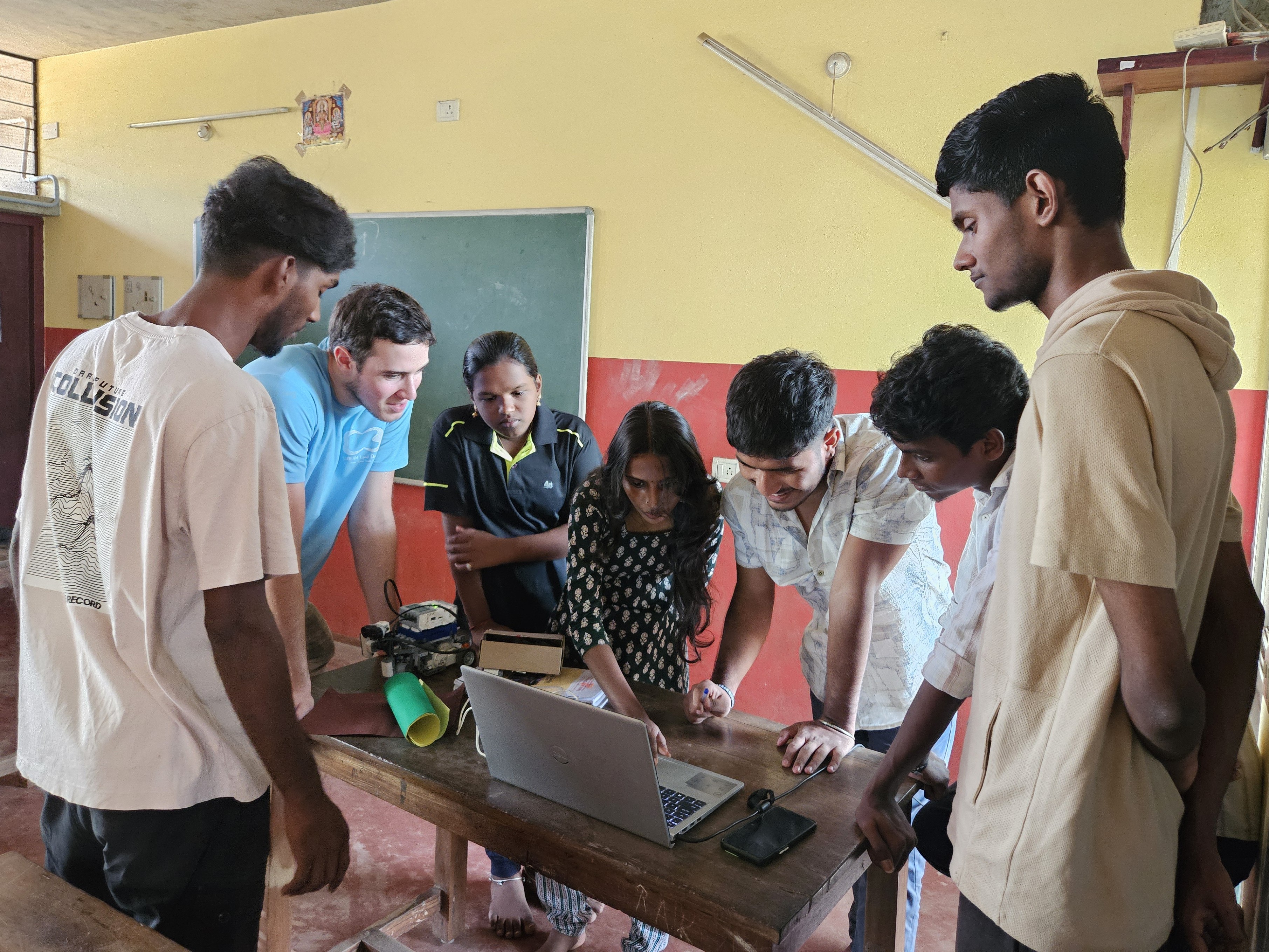
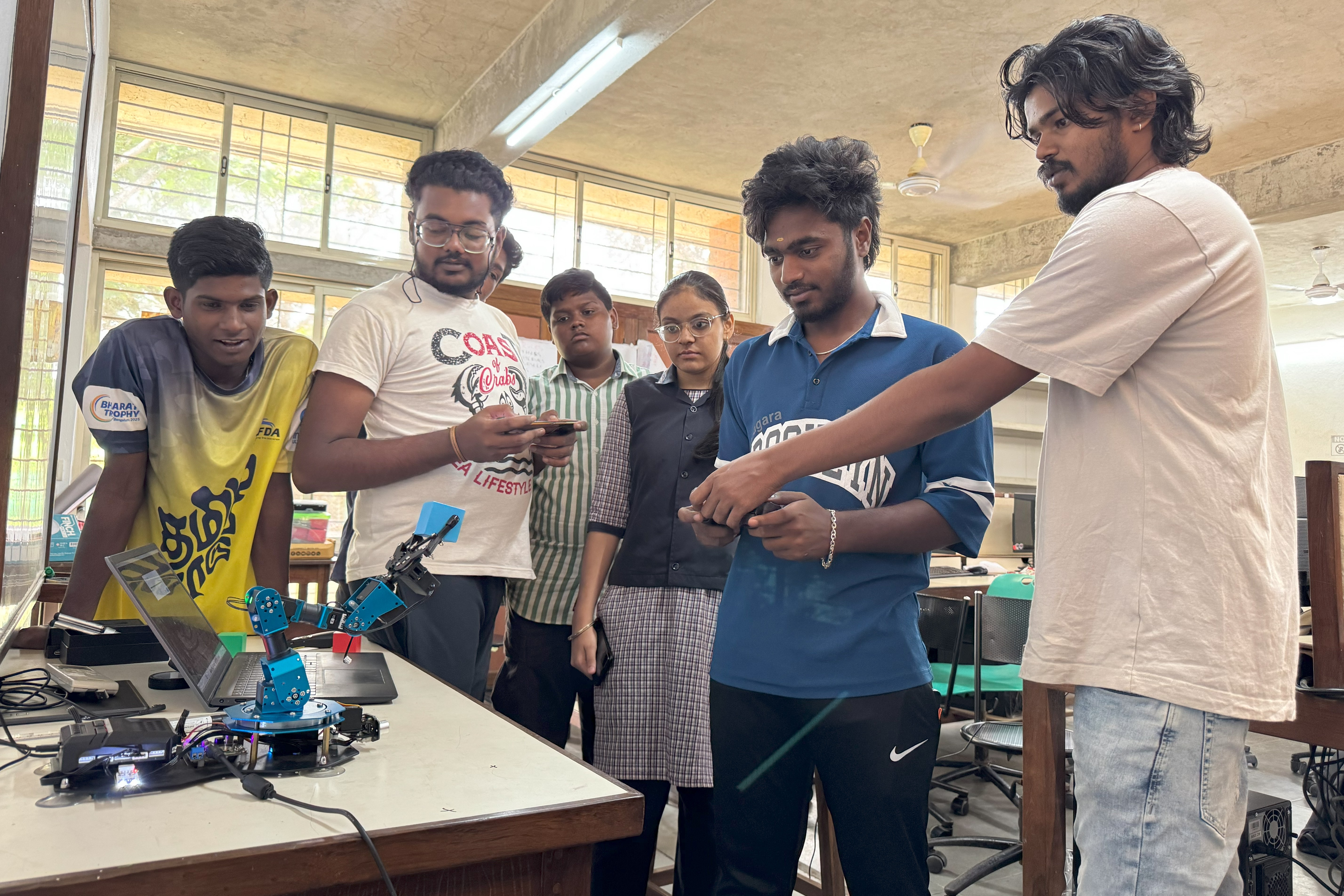
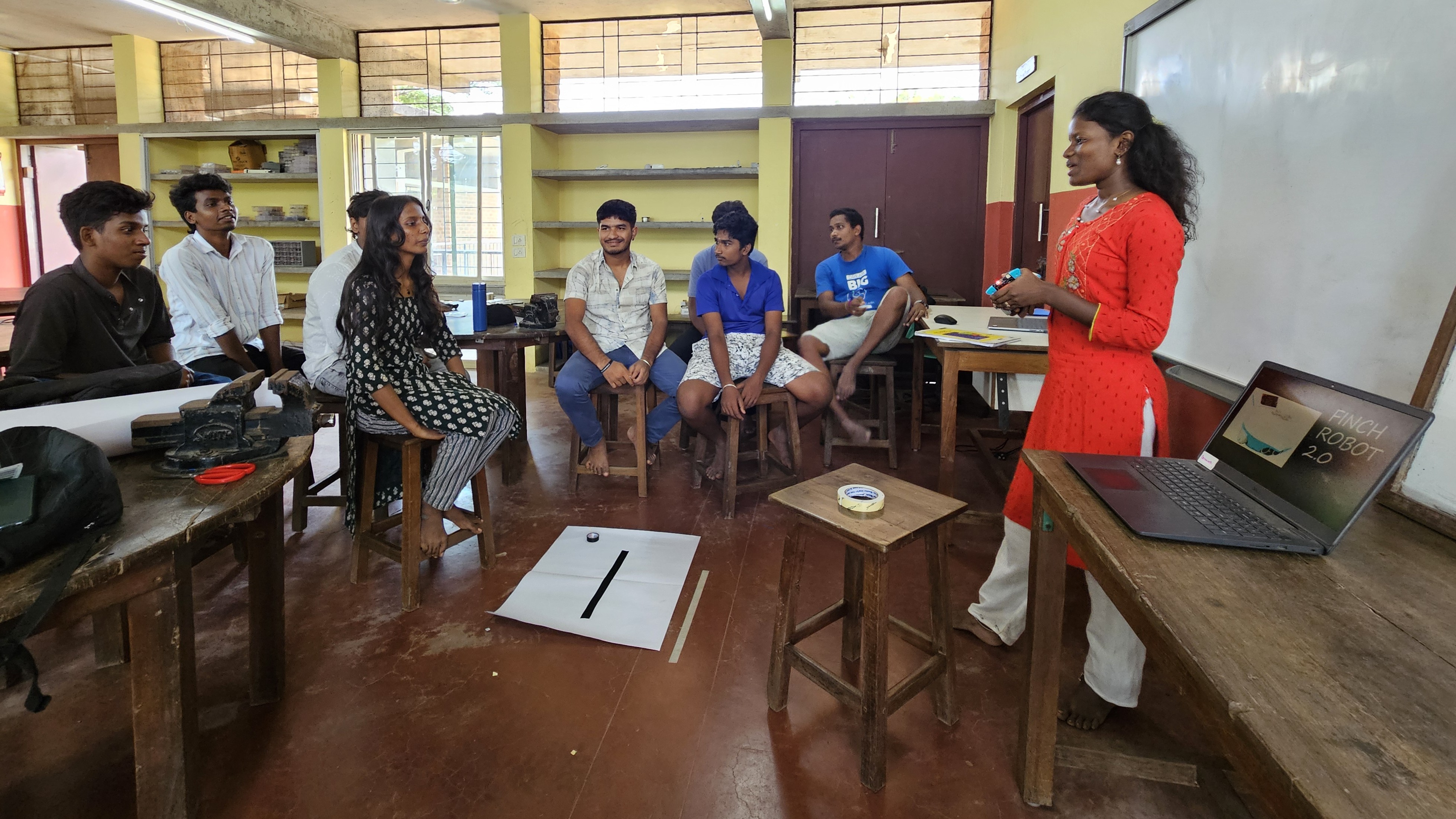
The participants were then divided into smaller groups. Each of the groups then took turns working on the following three projects, with the grouping allowing each participant to spend more time with the physical robots. The final goal of the Finch project was an intelligent line follower with obstacle detection and avoidance. The robotic arm was used to recognize different objects with their position, grap them, detect the color and then sort or stack them based on the color. The end goal with the Mindstorms robot was to utilize the variety of hardware and sensors and be able to escape from a maze on its own using the sensors.
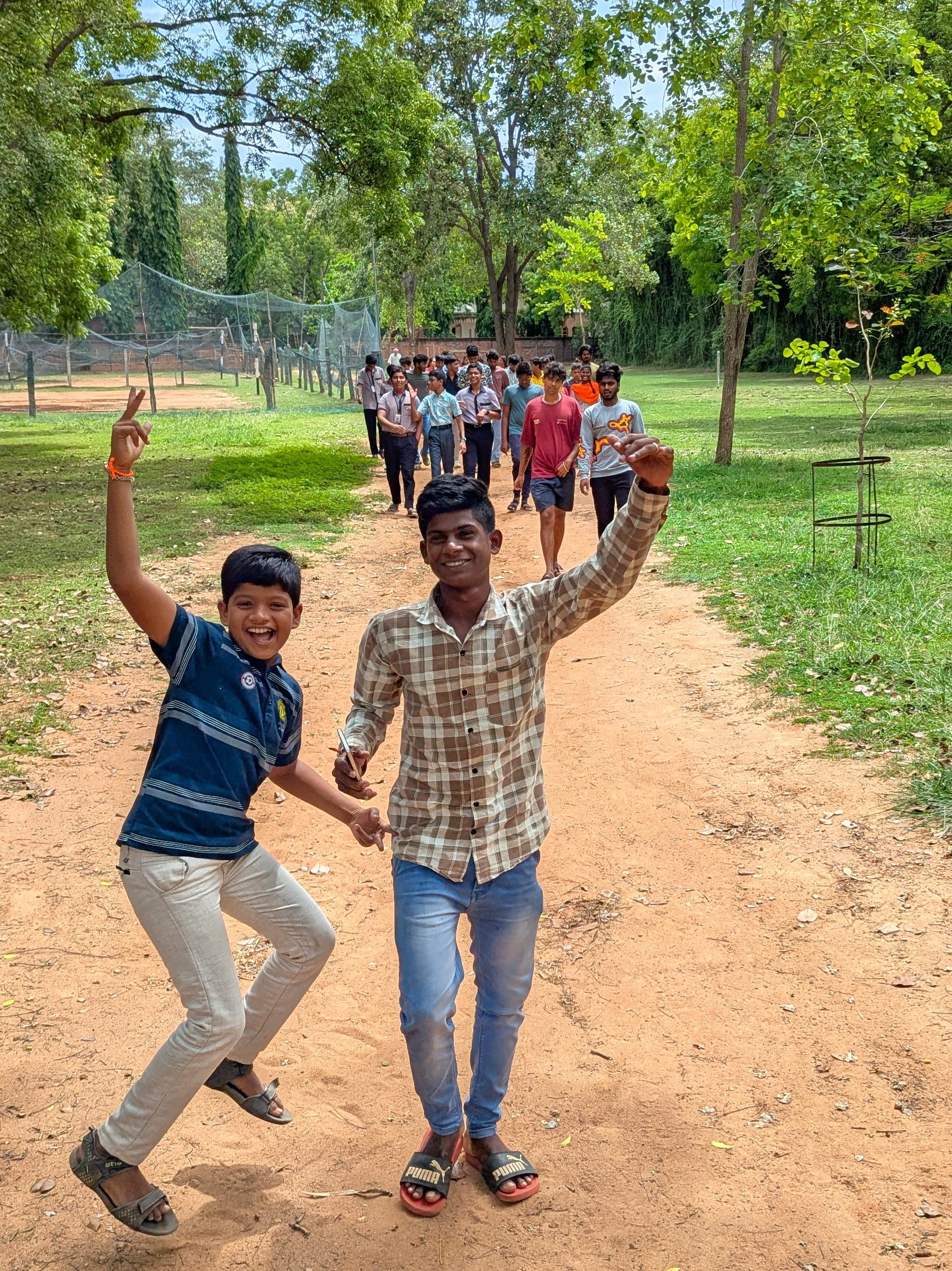
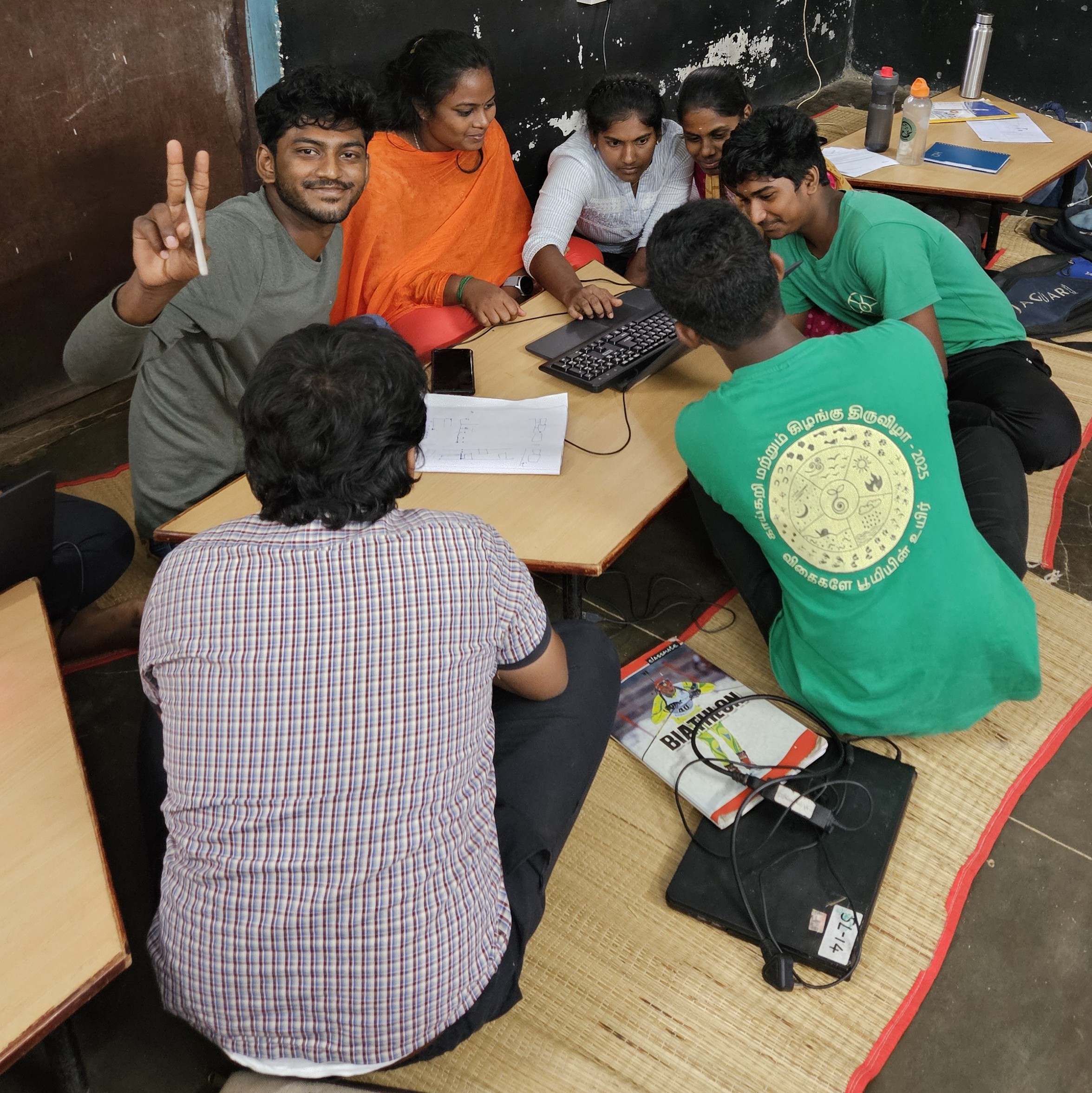

The second half oft the workshop focusrd on drones and final projects, and started with an impressive demonstration of an FPV (First Person View) camera drone on the sports field. We then demonstrated a miniature FPV drone in the STEM Land building and gave all participants the opportunity to see the surroundings from the perspective of the flying drone. Afterwards, we interactively gained an understanding of the components of a drone. We also explored together how the motors of a quadrocopter drone have to be controlled intelligently in order to move and rotate in different directions.

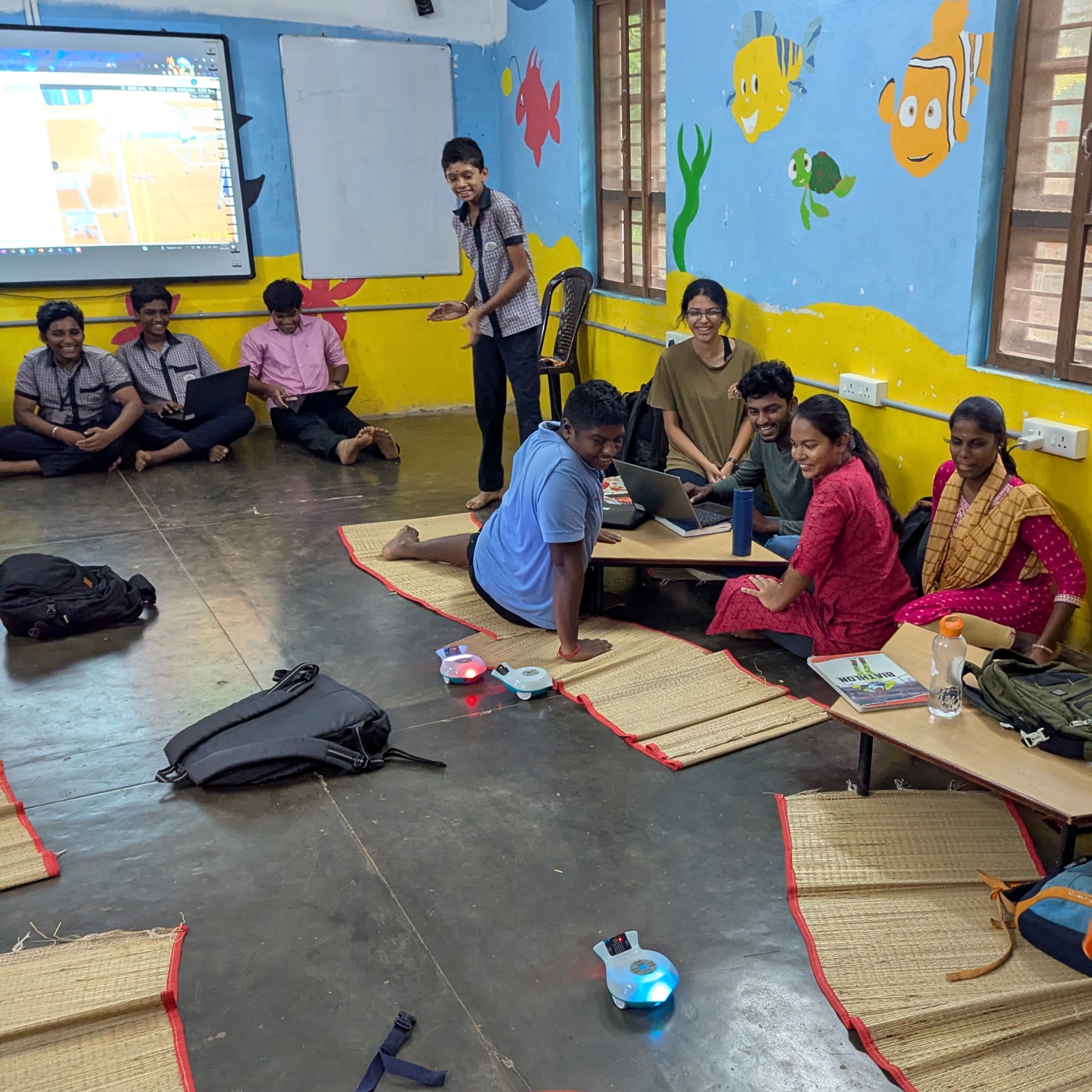
After that, there were again project groups to give the students better access to the drones. One project was drone hardware, motor control and measuring and understanding motor power and efficiency using a larger home-built drone. Another project was the opportunity for all participants to remotely control drones themselves and gain flying experience. Another group remotely controlled a drone with Scratch in a simplified simulation. The last group worked on advanced topics of the Finch robot. At the end of the workshop, the participants were able to choose a robot and work on a project of their choice under our mentoring. For example, we ended up with an exciting autonomous obstacle race of three Finch and one Mindstorms robots programmed by different groups of participants.
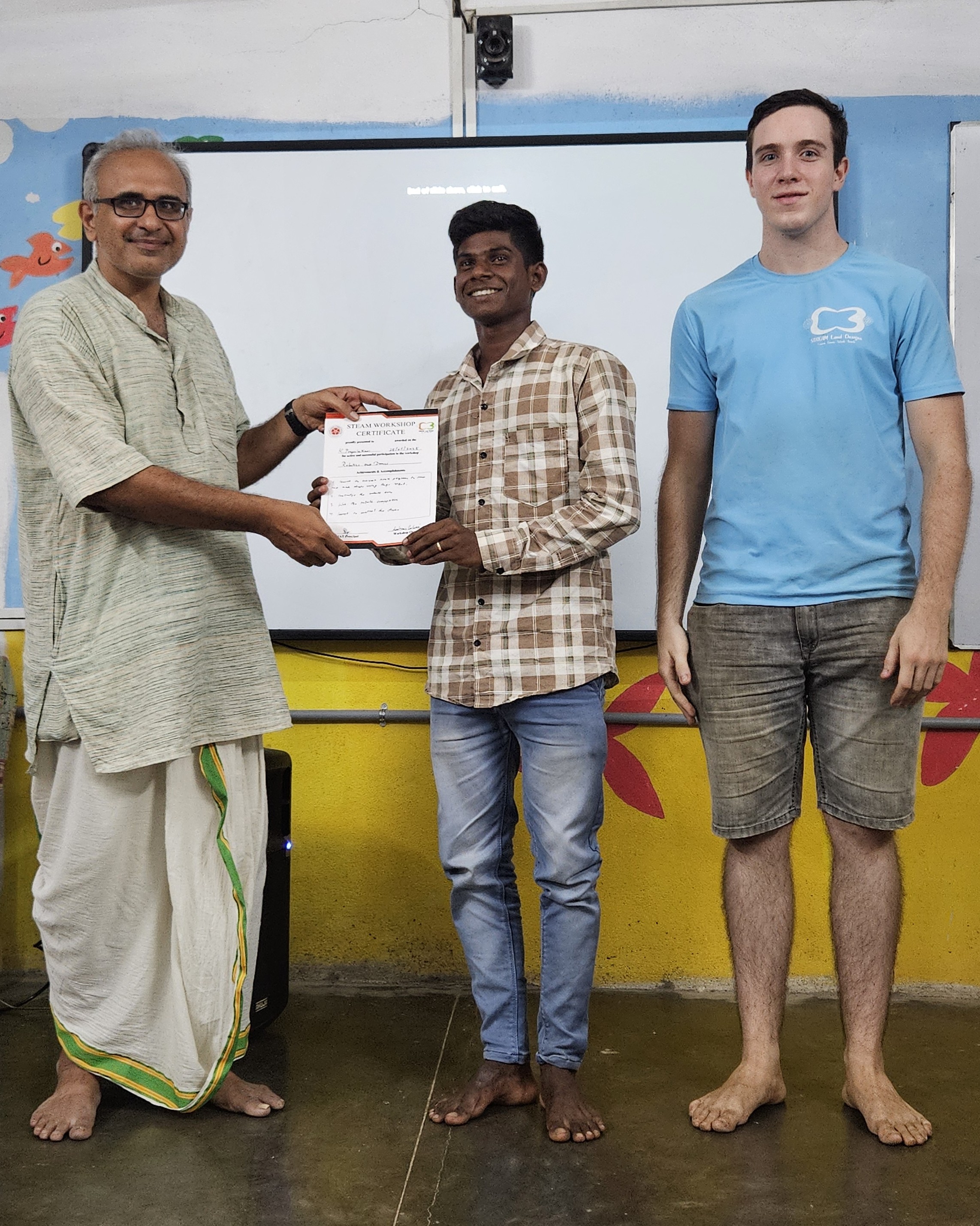
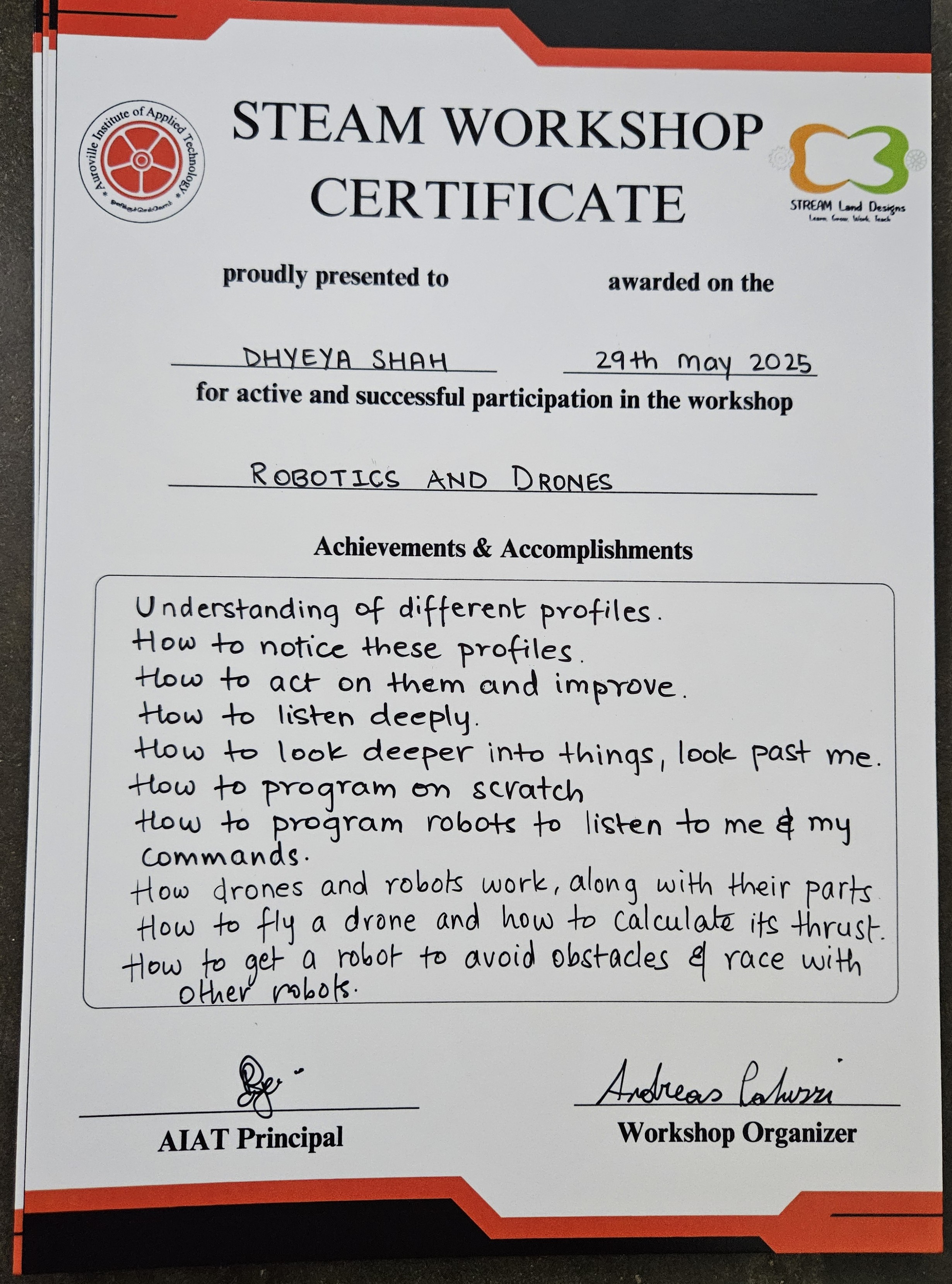
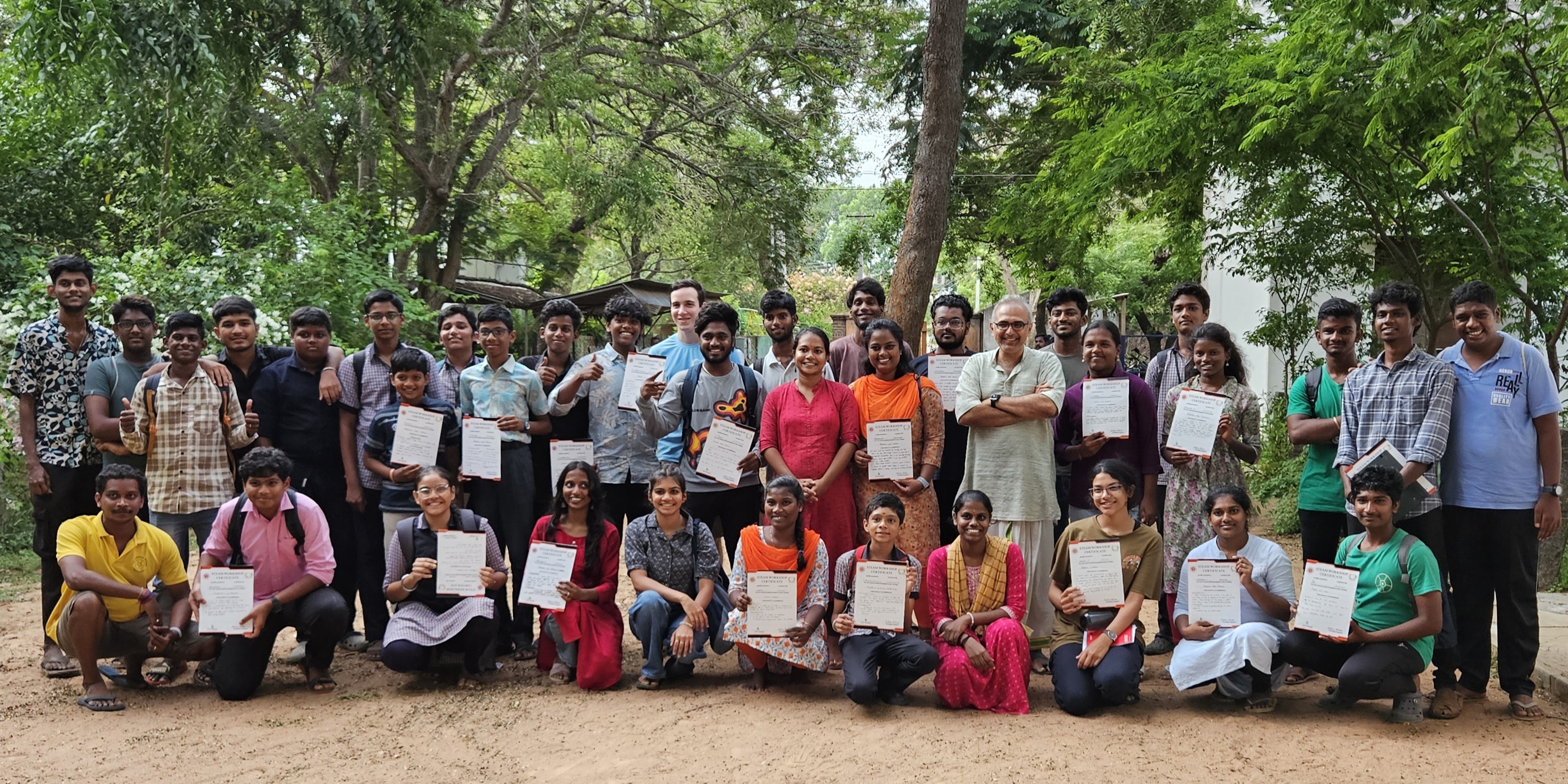
Goals of the Workshops
The main aim of the workshops was to make valuable STEAM courses freely accessible to the youth of Auroville and Pondicherry. We included RTL so participants understand, work and build projects from their inner values. We were not only able to give participants an understanding of technology and RTL, we actually managed to make them amazed, curious and wanting more.
Another goal was to make more people aware of the STEM Land, as well as AIAT and the B.Voc courses. To this end, we documented the workshops in high detail and quality with photos and videos. We then published these highlights on social media and our website, with great success. https://www.instagram.com/reel/DKjiK4rybIS/?igsh=YnV2a3Nia202Mzc2
The workshops also offered all the volunteering and participating members of our team (especially Shifuians) a great opportunity to learn, grow and teach. They demonstrated what our team and hardware is capable of. We gained a much deeper understanding of the existing technologies in STEM Land, and added completely new topics like drones. The research, training, skills, materials and presentations of the workshops are a great foundation for future events and lessons. They already proved extremely valueble multiple times, for example when conducting robotics workshops at Bishma Hunt and during electronics, robotics and drones workshops and lessons at Isai Ambalam and Udavi School. We are also recently offered a new round of STEAM Workshops based on them.


Research Paper
We are also working together with the Sri Aurobindo International Institute of Educational Research (SAIIER) on a study based on the STEAM workshops. The aim is to make teaching more practical, with independent learning, building skills and soft skills. The STEAM workshops had a focus on interactive learning and discovery, practical skills and also RTL for personal development. For the study, we examine the various outcomes, learning progress, successes, projects, insights and feedback that we were able to collect during the workshops.
My name is Gunavathi , I deeply care about happiness and perseverance for myself and others. I am doing becoming and being shifu master program at C3STREAM LAND in Auroville. I noticed in schools and colleges are followed textbook driven approach focused on writing examination and not experiential learning , in the result children will be lack of technical and critical thinking skill, further inner capacities (self-awareness, responsible and creativity ) and competencies. In this paper we explore the design and outcomes of three independently conducted STEM workshop(15 hours) that integrated reflective sessions along with leadership program and technological learning . On the workshop 3D printing, electronics, robotics with over 13 yrs in schools and colleges students. This allowed students to discover who they are and how they design their projects based on their universal value which will be helpful for others. In the end students reflected on their achievements and accomplishments in their certificate by themselves.
Reflections from the Volunteers
My name is Preethi. I stand for courage and kindness for myself and others. Attending the robotics workshop as a participant reminded me how important it is to stay curious and keep exploring new skills. I experienced the joy of discovery and the value of asking questions. When I went to the 3D printing workshop as a mentor, I realized how much we learn when we teach. Guiding others helped me deepen my own understanding, improve my communication, and see the subject from fresh perspectives. During the sessions, I noticed how children began to realize that whenever they create something with technology, it should be rooted in their values—responsibility, empathy, equity and courage to create. The RTL tools supported this reflection, helping them connect their creations to what truly matters to them. Both roles—learner and mentor—showed me that growth happens when we combine skills with values and stay open to learning in every role we play.
My name is Vaishnavi. K, I stand for Kindness, Unity and Respect for myself and others. Participating in the 3D Printing and Electronics workshops was a valuable experience. The hands-on approach, one-on-one interactions, and the chance to ask questions helped me learn new concepts and sparked my interest to explore more. Working on small projects and reflecting on my achievements at the end made the experience even more meaningful. Volunteering in the Robotics and Drone workshops was equally rewarding. Answering students’ questions boosted my confidence, and when I didn’t know something, I learned alongside them. Overall, these experiences helped me grow both as a learner and as a mentor.
My name is Aarthi, and I stand for perseverance—for myself and others. In the workshop, I saw how robotics can spark creativity and problem-solving in students. Guiding them through building, coding, and troubleshooting robots helped them see the connection between imagination and technology. I found the experience both fulfilling and enriching. Introducing participants to the basics of Mindstorms—its parts, components, and hands-on projects—helped them connect theory to real-life applications. Their curiosity and eagerness to experiment, along with everyone sharing their experiences, deepened my own understanding and reinforced my passion for making STEM education accessible and engaging. I also felt fortunate to explore and learn about a wide range of electronic technologies all in one place.
My name is Pravin.A I stand for compassion and equality for myself and others. I recently attended a three-week workshop covering Robotics & Drones, 3D Printing, and Electronics. During this time, I learned many new things that my college had never taught me. In fact, much of the experience felt like unlearning and relearning, because the explanations and ideas presented here were much clearer, more practical, and something I could carry forward with me. In the 3D Printing course, I was given the exciting task of turning my own idea into a printable design. It was happy to see my thoughts transformed into a object. In the Robotics session, I had the opportunity to work with xArm, Mindstorms, and Finch robots. I learned about their functionalities, how the control systems work, and that’s also when I was introduced to the Scratch programming language. Scratch made learning coding concepts much easier and more engaging. In the Electronics workshop, I built a stronger understanding of fundamental concepts. I also learned how to use various tools effectively, which gave me the confidence to troubleshoot and repair issues on my own.
My name is Ilakyaarasi. I stand for kindness and courage for myself and others. For this one week 3d printing workshop, I trained along with the team for 2 weeks. I learnt two designing platforms, which helped me to design a critical piece of a game. As learning for myself was a bit challenging, guiding others to create their design was too hard and fun also.I noticed that growth lies in uncomfortable situations and going through it at the best we can.
My name is Poovizhi. I stand for equality and equity for myself and others. I volunteered for the 3D printing workshop. We prepared ourselves for the workshop and learnt modeling and printing as part of the preparation. I designed a flower vase, and it came out so beautiful after it was printed. It was a nice experience to support the students during the workshop, and I also helped in delivering the RTL tools in the morning sessions before we started the 3D workshop. I was really inspired to see students who had more experience in Tkinter and were doing it so fast. The participants were super happy and excited when they saw their designs printed physically.
Arunkumar
I volunteered for a robotics workshop where I supported children during the Finch and drone sessions. The students were deeply engaged—enthusiastic in both the hands-on activities and the learning process. It was inspiring to witness them explore new technologies, learn to control robots, and develop coding skills with full focus and energy. While assisting in the drone workshop, I had the opportunity to expand my own knowledge—learning how to assemble drones, solder components, and flash firmware. This experience was not only technically enriching but also personally meaningful.I realized that when I’m aligned with universal values, I work from my full potential and able to manage my responsibilities and prepare for the workshop with clarity, purpose, and resilience.
My name is Preethi P, I stand for courage and happiness for myself and others. In 3D Printing, I turned my own idea into a printable design and saw it come to life, which gave me a sense of creativity and accomplishment. In Robotics, I learned about xArm, Mindstorms, and Finch robots, exploring their functionalities and discovering how their control systems work. Learning Scratch made coding concepts easier and more engaging, sparking my interest to explore programming further. I also volunteered in the Electronics sessions, where I guided children and students who were enthusiastic and curious about the projects. This experience was deeply satisfying as I not only taught them but also learned new perspectives from their questions. The sessions strengthened my fundamentals, improved my tool-handling skills, and boosted my confidence in troubleshooting and repairing issues. Overall, these hands-on experiences helped me grow both technically and as a teacher.
Participant Feedback
The feedback from workshop participants was consistently positive, with the following aspects being explicitly emphasized by many of them. The workshops were practical and offered the opportunity for hands-on learning, the inclusion of Radical Transformational Leadership is completely unique in this form and was perceived very positively, and the interactivity and the joint development and understanding of topics. Many of the participants wished for even longer workshops with even more time for projects. All in all, the workshops were very successful, below you can read the exact anonymous feedback of participants.
“Perfect balance of theory and practical knowledge which is not seen much in other workshops.”
“The interactiveness, the liveliness of the class, the frequent pauses for doubts, the social environment was great.”
“Giving leadership and ownership for each and every task. Punctuality & honouring each and individual works was amazing.”
“At other workshops they always share same example and same demo. But here they gave different example and demo. It also helped others overcome their fear while engaging with others.”
“Thanks for giving this wonderful opportunity and thanks a lot to all the volunteers and mentors who engaged me in the workshop fruitfully.”
“After the theory part we were able to explore everything. Exploring and doing some project on our own was fun and engaging.”
Author
poovizhi@auraauro.com
Related Posts

Saiier in Auroville future education with the quest of who am I Trichy students experience new education system
Press Release- Translated into English Auroville: Education as an Inner Quest – “Who am I?” Journeying Toward the Future through SAIIER. The...
Read out all
Taiwan Auroville educational and technological co-operation – Taiwan embassy general manager Stephen’s information
Dinamalar Press Release Director-General Stephen of the Taiwan Embassy, accompanied by assistants Sai Ming-shun and Chao Sang-Lench, made a special visit to...
Read out all
Taiwan team in Auroville to explore collaboration opportunities
(The Hindu Press Release) A Taiwanese delegation led by Stephen S.C. Hsu, Director-General of the Taipei Economic and Cultural Centre in Chennai,...
Read out all
Auroville researchers aim to ignite global interest in traditional mathematics education at Seoul meet
Sanjeev Ranganathan, Head of SAIIER (Sri Aurobindo International Institute of Educational Research) and associate Poovizhi will be presenting a paper on traditional...
Read out all
Integrated education practitioners was held in auroville.
Press Release: [translated from Tamil] Auroville successfully concluded the “Fifth Integrated Education Practitioners’ Gathering” (IEPG5) — a three-day conference initiated by Dr....
Read out all
The Workshop for trainers- to express the full potential of children
Press Release [translated from Tamil] The workshop for trainers aimed at unlocking the full potential of children has concluded successfully. This was...
Read out all